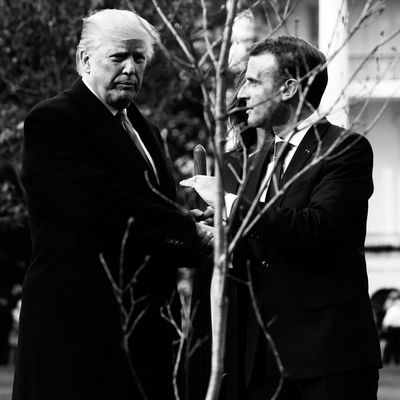
Europe, we’re always told, is the champion of diplomacy — the reigning wizards of deploying words and guile to get their way, while we unsophisticated Yanks run around firing missiles and threatening trade wars.
This week, the leaders of Europe are lined up to work their wicked wiles on Donald Trump, at a time when there are major disagreements on climate policy, trade, and — above all, at the moment — how to handle the Iran nuclear deal. We get to watch and observe the latest strategy from the Continent — a product of French and German coordination — for influencing and containing Donald Trump, all while keeping things at least superficially friendly.
Emmanuel Macron, now Europe’s good cop in all matters Trump, arrived over the weekend after previewing his trip with an appearance on Fox News — not a normal haunt of French leaders. He informed viewers at the conservative cable network that he is a “maverick” who, like America’s president, is “not part of the classical political system.”
Macron also arrived in Washington with a gift — a sapling from Belleau Wood, the World War I site 60 miles outside Paris that saw was the bloodiest battle for U.S. Marines in the history of the service. It is the source of a famous Marine retort: “Retreat? Hell, we just got here.” Perhaps Macron sees the gesture as a way to soften Trump up by playing to his love of military symbology. Or perhaps he just sees himself as starting a new chapter in U.S.-French relations, young and budding. (If you’re wondering what Trump is giving Macron in return, it’s a framed bit of upholstery from an antique chair cushion — make of that what you will.)
Trump, who generally holds court either at his eponymous D.C. hotel or over small White House gatherings, seems to be basking in all of Macron’s charm: He is dining not once, but twice, with the French president — Monday night down the river at Mount Vernon and Tuesday in the first state dinner of the Trump administration. Of course, Establishment Washington is sputtering with shock that not a single Democrat was invited, a dramatic break with 200 years of protocol, but this doesn’t matter to Macron. The Democrats are not his audience until Wednesday, when he speaks to a joint meeting of Congress, something no French leader has done since 1996.
So this is a remarkable moment of French-American rapprochement. Rather than political agreement, it is driven, like so much else with Trump, by the force of personality — Macron’s, in this case — and the European assessment that pomp and circumstance are key to wooing our president. Which is not to say that the two nations haven’t been involved in lots of substantive dealings lately: The French cooperated to launch strikes on Syria in retaliation for its use of chemical weapons; they also disagreed within days of the attack on what their follow-up should be. Macron strongly opposes Trump’s desire to bring all U.S. troops home from Syria, and told the press he had succeeded in convincing Trump to change his mind. The White House begged to differ.
The second prong of Europe’s Trump-management strategy will be on display at the end of the week when German chancellor Angela Merkel arrives in Washington. She won’t have the trappings of a state visit, and the burning media question will be whether she receives the public handshake that Trump famously denied her during her 2017 visit. Not that things have been gotten much better: At a later meeting, Trump repeatedly insisted that the two negotiate a bilateral trade deal — authority Germany ceded to the EU long ago. The two leaders did not speak for five months, which makes this return visit all the more remarkable.
If Macron hopes to win over Trump by force of personal argument — as reports out of today’s meetings seemed to suggest, with the two saying they were close to a common understanding — Merkel’s job is to close with the larger economic and security context. She is, at least in theory, Trump’s fellow conservative; Germany’s public opinion is considerably more negative toward Trump than is France’s, so Merkel has nothing to lose and perhaps something to gain at home by talking tough. Europeans are looking to her to tell Trump what the costs of a dissolved Iran deal, and an escalating trade war, would be. German diplomats were heard saying before the trip that Macron is the show horse, while Merkel is the work horse. But that strategy depends, as Europe-watcher Julianne Smith put it, on Trump actually wanting to do some work.
The Europeans have been uncharacteristically public and blunt that the overriding goal in this unusual one-two punch is to convince Trump to stay in the six-party deal negotiated in 2015 to freeze and roll back Iran’s nuclear program. If he is determined to make a show of abrogating it, they still hope to convince the U.S. to abide by its core provisions, leaving in place the incentives for Iran to do likewise.
The president created a May 12 deadline to tell Congress whether or not he will recertify Iran’s compliance with the deal (a political matter separate from the report issued by the State Department this week, confirming Iran’s continuing compliance with the negotiated terms) — something he will do if he is satisfied with proposed side agreements. U.S. negotiators have worked with European colleagues to put together new terms that would extend some of the deal’s provisions and add restrictions on the ballistic missiles that Iran can use to threaten Israel, regional U.S. military installations, and Europe.
Macron and his colleagues seem to hope that agreement with Europe will be enough to keep Trump in, but it may not be that simple. Russia and China, which are also signers of the 2015 deal, used a meeting between their foreign ministers this week to oppose any changes. Iranians themselves have found the deal’s outcomes disappointing — Western companies have been slower than expected to invest, living standards have not improved, and Iranian émigrés returning home have been caught up by repressive state security forces, dampening hopes for a cultural opening.
Macron and Merkel are hoping that acquiescence on side deals, plus the in-person touch, will yield the outcome they want. But in Donald Trump’s Washington, the two weeks between their visits and the May 12 certification date is a lifetime. In those intervening days, tensions with Europe could flare anew as its exemption from America’s new steel-and-aluminum tariffs expires on May 1. U.S. negotiations with North Korea, which benefit from the continued existence of the Iran deal, could also falter. Trump’s new coterie of hawkish advisers will likely be bending the president’s ear after Macron and Merkel have left.
But Merkel, who is in her 18th year as Germany’s center-right standard-bearer, knows as well as anyone on the global political scene the lesson of Macron’s tree from Belleau Wood. Whatever the folly, whatever the cost, there is no retreat. There is only forward.





























